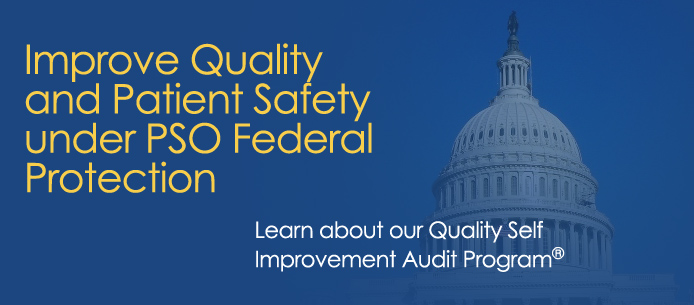
American Medical Foundation Patient Safety Organization (AMFPSO)
The American Medical Foundation is listed as a Patient Safety Organization (PSO) authorized by the Agency for Healthcare Research and Quality (AHRQ), on behalf of the Secretary of the U.S. Department of Health and Human Services.
What is a Patient Safety Organization (PSO)?
PSOs are designed to help clinicians, hospitals and health care organizations improve the care they deliver to patients by encouraging them to conduct quality and safety analyses. Through federal protections of legal privilege and confidentiality, which are authorized by the Patient Safety and Quality Improvement Act of 2005, PSOs foster a culture of safety and create a secure environment where providers can collect and analyze data to identify and reduce the risks and hazards associated with patient care.
How can Peer Review be protected?
Peer Review can be performed under the PSO and not be subject to legal discovery in accordance with federal law. A Patient Safety Evaluation System will be established, and the information, such as a sentinel event analysis (for example) becomes part of the Patient Safety Work Product and is not discoverable. It is privileged and confidential under Federal law. Peer review confidentiality laws are inconsistent and differ from state to state. In some states such as Florida and Kentucky, peer review protections are non-existent. Therefore, it is important to have confidence that data collected is secure.
Why should you contract with AMFPSO?
- The Affordable Care Act (Section 1311) mandates that all hospitals over 50 beds must establish a Patient Safety Evaluation System under a PSO, in order to contract with Insurance Exchange Qualified Health Plans.
- There is no statutory limit on the number of PSO’s that a health care organization can have. So belonging to another PSO, to collect Risk Management data, for example, does not prevent contracting with AMFPSO to protect patient care data.
- Since PSO’s have many different purposes, it is important to join with one that specializes in peer review and education. AMFPSO is ideal for that purpose and has the experience and reputation for excellence.
AMFPSO Quality Self Improvement Audit Program ®
The AMFPSO now provides a Quality Self Improvement Audit Program® in every medical and surgical specialty. For over 25 years, AMF has been nationally recognized for its ability to address the issues of quality in all specialties including interventional cardiology, pacemaker and ICD utilization, returns to surgery and surgical outcomes, radiology interpretation error rates and pathology error rates.
With the Quality Self Improvement Audit Program® and our specially developed tools, we are now able to assist hospitals in addressing other issues of medical necessity, re-admissions and more.
Read about our program in Cath Lab Digest, June 2013
How AMFPSO Works with Hospitals to Protect Peer Review
The Patient Safety and Quality Improvement Act of 2005 (PSQIA) and the regulations there under that were issued in November 2008 allow organizations engaged in “patient safety activities” to use and share information related to those activities without fear that the information will be discovered in a lawsuit. As the preamble to the regulations states: For the first time, there will now be a uniform set of Federal protections that will be available in all states and U.S. territories and that extend to all health care practitioners and institutional providers.”
Thus, in order to gain the protection for patient safety work product provided by the law, health care providers must first establish a relationship with a PSO. PSOs are organizations that share the goal of improving the quality and safety of health care delivery.
By providing both privilege and confidentiality, PSOs create a secure environment where clinicians and health care organizations can collect, aggregate, and analyze data, thereby improving quality by identifying and reducing the risks and hazards associated with patient care.
Thus, hospitals and other providers that contract with American Medical Foundation Patient Safety Organization (AMFPSO) can perform peer review under AMFPRO and share information to the AMFPSO and have that information, as well as reports back from the AMFPSO protected from discovery in almost any kind of state or federal civil, criminal and administrative proceedings, including malpractice lawsuits. Information being collected by the provider for reporting to the AMFPSO would also be protected from discovery, as would any analysis of that information by the AMFPSO. The protection provided by the PSQIA goes far beyond anything currently provided by state peer review laws.
PSOs also are designed to aggregate data across multiple health care provider groups, which will help identify issues quickly and allow improved early warning and communication about ways of reducing risk and improving quality. As de-identified data become available from PSOs, a Network of Patient Safety Databases will receive, analyze, and report trend data nationally which will be included in AHRQ’s annual National Healthcare Quality Report.
“We know that clinicians and health care organizations want to participate in efforts to improve patient care, but they often are inhibited by fears of liability and sanctions,” said AHRQ Director Carolyn M. Clancy, M.D. “PSOs facilitate a shared-learning approach that supports effective interventions to reduce risk of harm to patients and improve quality.”
For further information please call our offices at 215–545-6363 .
